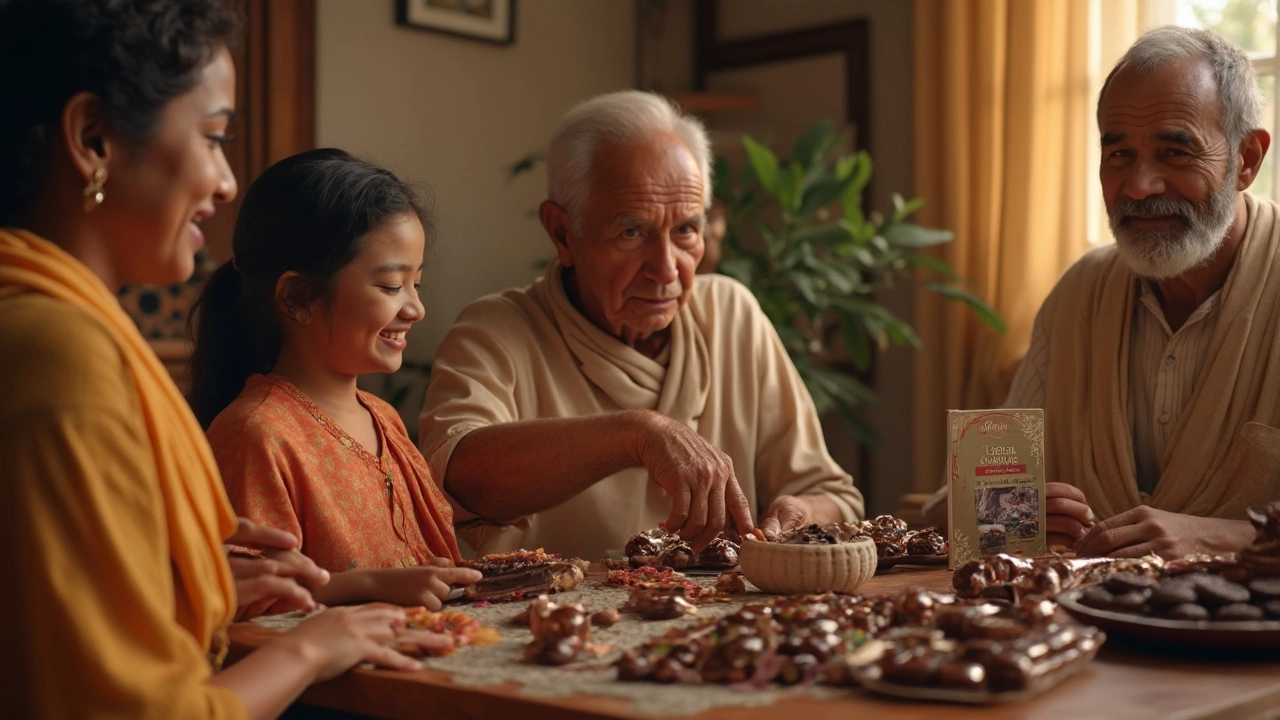16 Feb 2025
- 0 Comments
Okay, so you’re thinking, chocolate is just chocolate, right? Not exactly. If you’re a Muslim or familiar with Islamic practices, you know that halal (permissible) vs. haram (forbidden) plays a significant role in food choices. While chocolate is generally safe, it’s not just about having a sweet tooth; the story goes a little deeper.
First off, it’s all about what goes in it. Ingredients like vanilla extract might raise eyebrows as they contain alcohol, which isn’t halal. Confectionery often sneaks in hidden ingredients like gelatine derived from pigs, or even certain emulsifiers that tip the scale from halal to haram.
Looking for halal chocolate is like finding a treasure—it’s there, you just need to know where to look. Certificate labels are a good place to start; if it’s halal certified, you’re golden!
- Understanding Halal in Islam
- Common Ingredients in Chocolate
- Harmless vs. Haram Additives
- Choosing Halal Chocolate
- Exploring Indian Sweets with Chocolate
- Tips for Halal Sweets at Home
Understanding Halal in Islam
So, you're probably asking, what exactly does halal mean? It's basically a term in Islam that refers to anything allowed under Islamic law. It goes beyond just food but since we're talking about chocolates and sweets, let's focus there.
In the world of food, halal is about making sure what you're eating adheres to the dietary guidelines specified in the Quran, the holy book of Islam. For instance, Muslims avoid pork and alcohol, so any food containing these or their derivatives is haram, the opposite of halal.
What Makes Chocolate Halal?
For chocolate to be halal, the ingredients and the production process need to be checked out thoroughly. Basic ingredients like cocoa, sugar, and milk are usually halal, but it's when you get into extras that things can get tricky.
- Emulsifiers: These help mix ingredients that usually don't mix, like oil and water. Soy lecithin is a common emulsifier and it’s halal if sourced from plant-based ingredients.
- Gelatin: Often used for chewy textures, this is generally haram since it's usually made from pork. But don't worry, if derived from halal animals, it's safe.
- Flavorings: Some flavorings contain alcohol, even in small amounts. So, lookout for natural or halal-certified labels.
Ensuring a Halal Lifestyle
For many, following halal is a personal and spiritual commitment. While navigating the chocolate aisle might seem daunting, sticking to brands that label their products or opt for organic or basic recipes can help. Plus, there’s a growing market for halal-certified products, even among Indian sweets, making it easier to enjoy treats without concern.
Common Ingredients in Chocolate
When you unwrap a bar of chocolate, you’re often greeted with a list of ingredients that can seem like a foreign language. But a closer look can reveal whether it fits into the halal chocolate category for Muslims. Knowing which ingredients to look out for is key.
Cocoa Liquor and Cocoa Butter
At its core, chocolate is made from cocoa beans processed into two main components: cocoa liquor and cocoa butter. These are naturally halal. The beans are processed to extract these flavorful essences, which form the base of any chocolate product.
Sugar
Sugar is generally a safe bet when it comes to halal considerations. However, some refined sugars might involve filtration processes using bone char from non-halal sources, though this is quite rare in many regions today.
Emulsifiers and Additives
This is where you need to start paying attention. Emulsifiers like lecithin are often derived from soy, which is fine unless specified otherwise. However, beware of more questionable ingredients such as gelatine, often used for texture. According to the
Islamic Food and Nutrition Council of America, "Gelatine derived from pork sources is unequivocally haram."It’s essential to check certification or the specifics of these additives.
Alcohol in Flavorings
Sometimes, flavorings use alcohol as a carrier, which turns a blind spot for many. Vanilla extract is a classic example. Many chocolate makers now offer alcohol-free extracts, but check the label to be sure.
All these factors make for a checklist when grabbing that next bar. It’s about keeping the enjoyment of chocolate while aligning with Islamic values. And remember, most of the time, chocolates especially in supermarkets that carry halal certifications are a safe choice.
Harmless vs. Haram Additives
When it comes to **Muslims and chocolate**, the devil's really in the details—or in this case, the ingredients list. While plenty of chocolates are perfectly halal, some common additives can turn that sweet treat into something off-limits.
Watch Out for Emulsifiers
Emulsifiers are used to keep chocolate smooth and creamy, but not all are halal. Ingredients like mono- and diglycerides can be sourced from either plant or animal oils. The trouble starts if they’re derived from pork or other non-halal animals. Always check if the chocolate is marked as halal certified on the packaging. It’s your easiest clue!
Understanding Alcohol-Based Flavors
Now, alcohol might not be the first thing you think of when biting into a chocolate bar, but it can sneak in through flavorings. Chocolates that use vanilla flavoring often contain traces of alcohol. While these aren’t usually enough to intoxicate, it still raises concerns for strict halal followers.
Hidden Animal Products
If you’re dealing with chewy, caramel-filled chocolates, gelatine might be at play. If it’s made from pork, it’s definitely **haram**. Look for chocolates that clearly state they’re gelatin-free or use plant-based alternatives.
Here’s the golden rule: When in doubt, check it out. Look for the **halal chocolate** certification, or simply opt for brands known for their commitment to halal production. This awareness helps you enjoy those sweet moments without any worry.
| Additive | Halal Consideration |
|---|---|
| Mono- and Diglycerides | Check if plant or animal-based |
| Vanilla Extract | Look for non-alcohol versions |
| Gelatine | Ensure it's from a halal source or plant-based |

Choosing Halal Chocolate
When you're on the hunt for halal chocolate, it helps to be a bit of a detective. Grab your favorite bar and flip it over; the ingredient list is your best friend. Look out for any suspicious terms like 'gelatine' or 'confectioner's glaze'—these might need further investigation.
Check for Certification
One of the simplest methods is to check for a halal certification. These stamps show that a product meets Islamic dietary standards. It’s not just random design—organizations like the Islamic Food and Nutrition Council of America (IFANCA) rigorously inspect and certify foods.
"Chocolate is a treat religion permits, as long as it is prepared with ingredients that comply with dietary laws." – IFANCA
Being Ingredient-Savvy
Aside from certifications, knowing what’s halal is key. Ingredients like lecithin are common in chocolate production. Sounds fine, right? But lecithin can be derived from either soy (halal) or egg yolks, so you need to know which one is used.
Also, beware of alcohol-based flavorings. Yes, even that tiny amount in vanilla extracts can make some chocolates haram.
Look for Trusted Brands
Certain brands go the extra mile to cater to their Muslim consumers, clearly labeling their products halal. Cadbury and Nestlé offer options in some regions. It’s worth checking their official websites for lists of halal-certified chocolates.
DIY Approach
If you're feeling adventurous and want to ensure total control, why not make your own chocolate treats? Using basic halal-certified ingredients like cocoa, sugar, and milk powder, you can whip up something that's tasty and worry-free.
Here's a quick equipment checklist to get started:
- A heatproof bowl for melting chocolate
- A whisk for keeping everything smooth
- Baking molds for shaping your creations
Choosing halal chocolate might be daunting at first, but with a bit of investigation, you can comfortably enjoy your treats and ensure they meet your dietary needs.
Exploring Indian Sweets with Chocolate
Adding chocolate to Indian sweets might sound like a western twist, but it’s been gaining ground and for good reason. Imagine gulab jamun, those syrupy, melt-in-your-mouth dough balls, then picture them dipped in a rich, dark chocolate sauce. Yes, that’s real, and it’s a game-changer.
So, how do we combine these worlds while keeping it halal? Many Indian sweets use ghee, milk, nuts, and cardamom, which blend seamlessly with halal chocolate options. Start experimenting with these classic sweets:
Chocolate Barfi
Barfi, that deliciously thick milk-based sweet, can be elevated with a chocolate layer. Just melt some halal chocolate and layer it over your traditional barfi for a fusion dessert. This gives it a delightful chocolatey twist while sticking to halal-friendly ingredients.
Chocolate Peda
Peda is another sweet treat made from khoya (milk solids). Adding cocoa powder or melted chocolate into the mix transforms these classic sweets into chocolate pedas. Make sure to choose a cocoa powder with halal certifications.
Practical Tips
- Check your chocolate source: Look for labels or certifications that confirm the ingredients are halal.
- Use quality cocoa: Not all cocoa powders are made equal; pick one that fits halal requirements.
- Adapt traditional methods: Use classic recipes but add chocolate components carefully to balance flavors.
These adaptations serve as a bridge between traditional Indian sweets and modern chocolate tastes, blending cultures on every dessert plate.
Tips for Halal Sweets at Home
Let’s make it clear—having sweet treats that align with Islamic dietary laws isn’t as hard as it sounds. You just need to know what to shop for and how to prepare those lovely sweets at home.
Check Those Ingredients
Start by checking every single thing that goes into your sweets. Many chocolates are inevitably free from non-halal ingredients, but watch out for things like gelatin and certain additives. Opt for halal chocolate that's clearly labelled. Checking for a halal certification can save you a bunch of guesswork.
DIY Sweets Are A Game Changer
Why not go the extra mile and make your own sweets? This way, you control all the ingredients. You can make wonderful Indian sweets like chocolate burfi or laddoos using halal-certified ingredients.
Shop Local or Go Online
More specialty shops cater to halal needs than you’d think. Visiting a local halal store or checking online options can give you access to a wide range of halal-certified goodies. Plus, it's always exciting to discover new sweets or chocolates you haven't tried yet.
Experiment with Flavors
Don’t be afraid to mix things up—literally! You can blend Indian sweets recipes with a twist of chocolate. Think of adding a chocolate layer to traditional flavors or a simple chocolate drizzle over gajar ka halwa.
Quality Over Quantity
Remember, when it comes to sweets, sometimes less is more. Choose higher quality halal options rather than lots of questionable items. It not only follows your dietary guidelines but might be better for your health too.
By following these steps, you can satisfy your sweet cravings without compromising your principles or taste. There's a whole world of halal sweets waiting to be explored, right from your kitchen.
